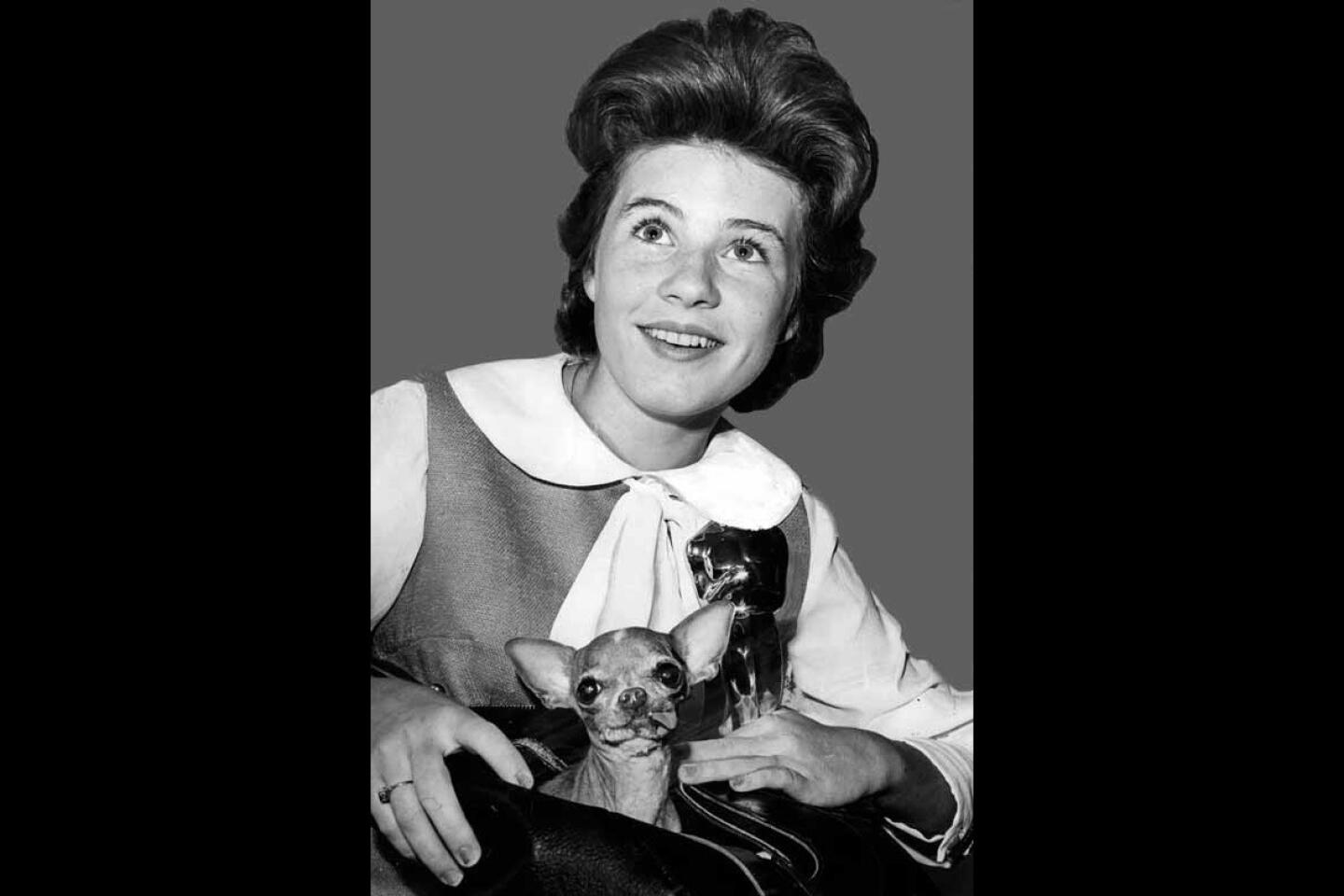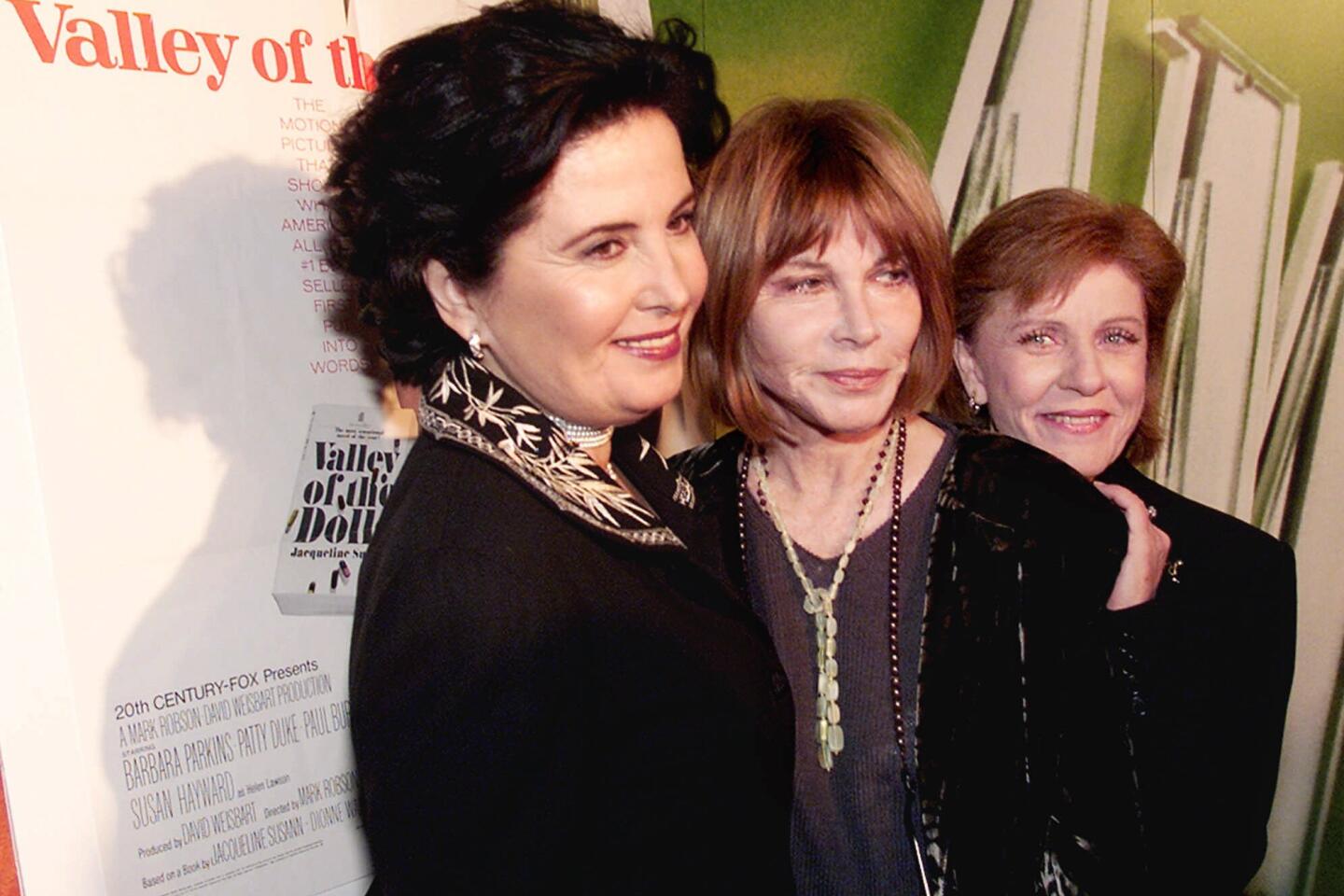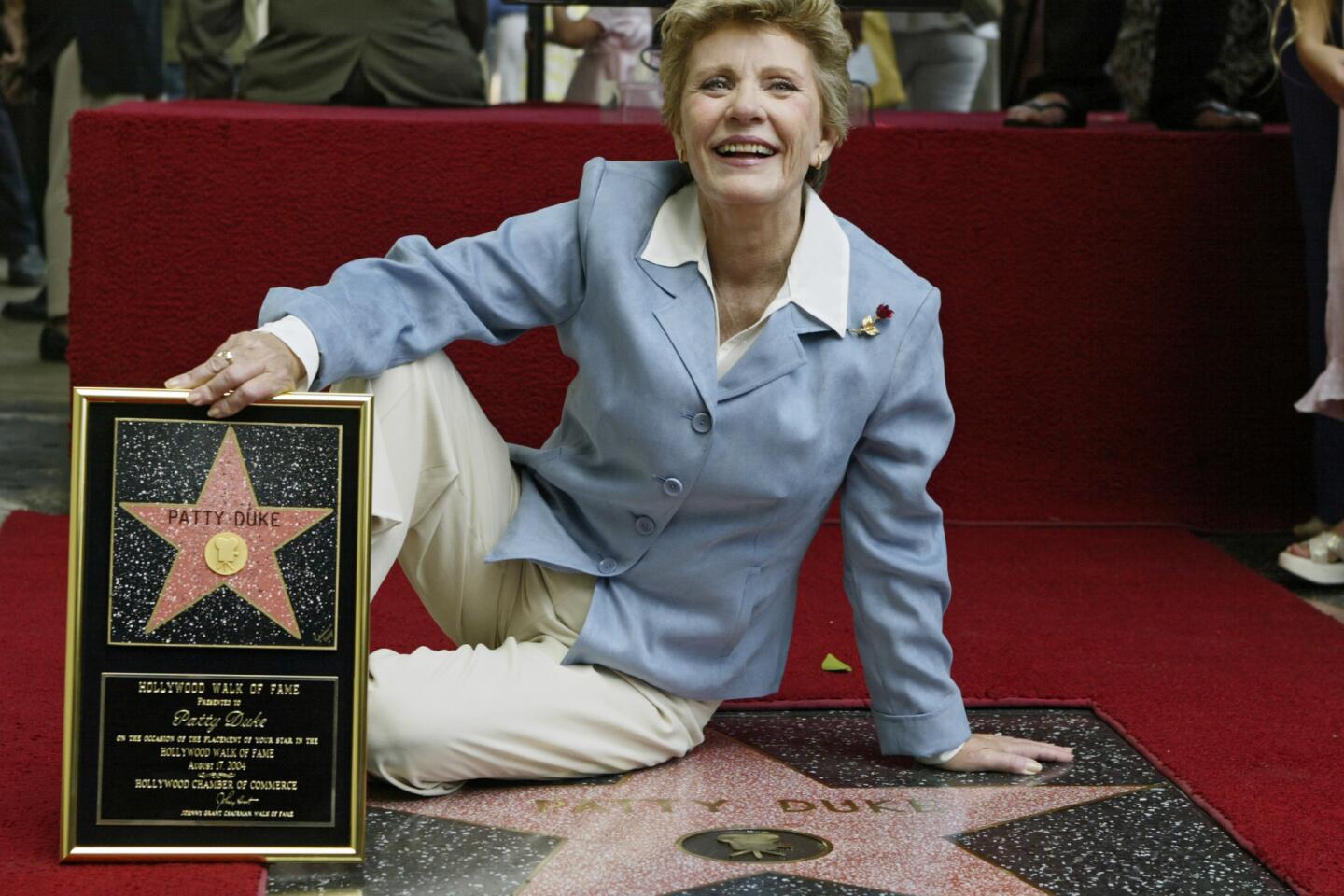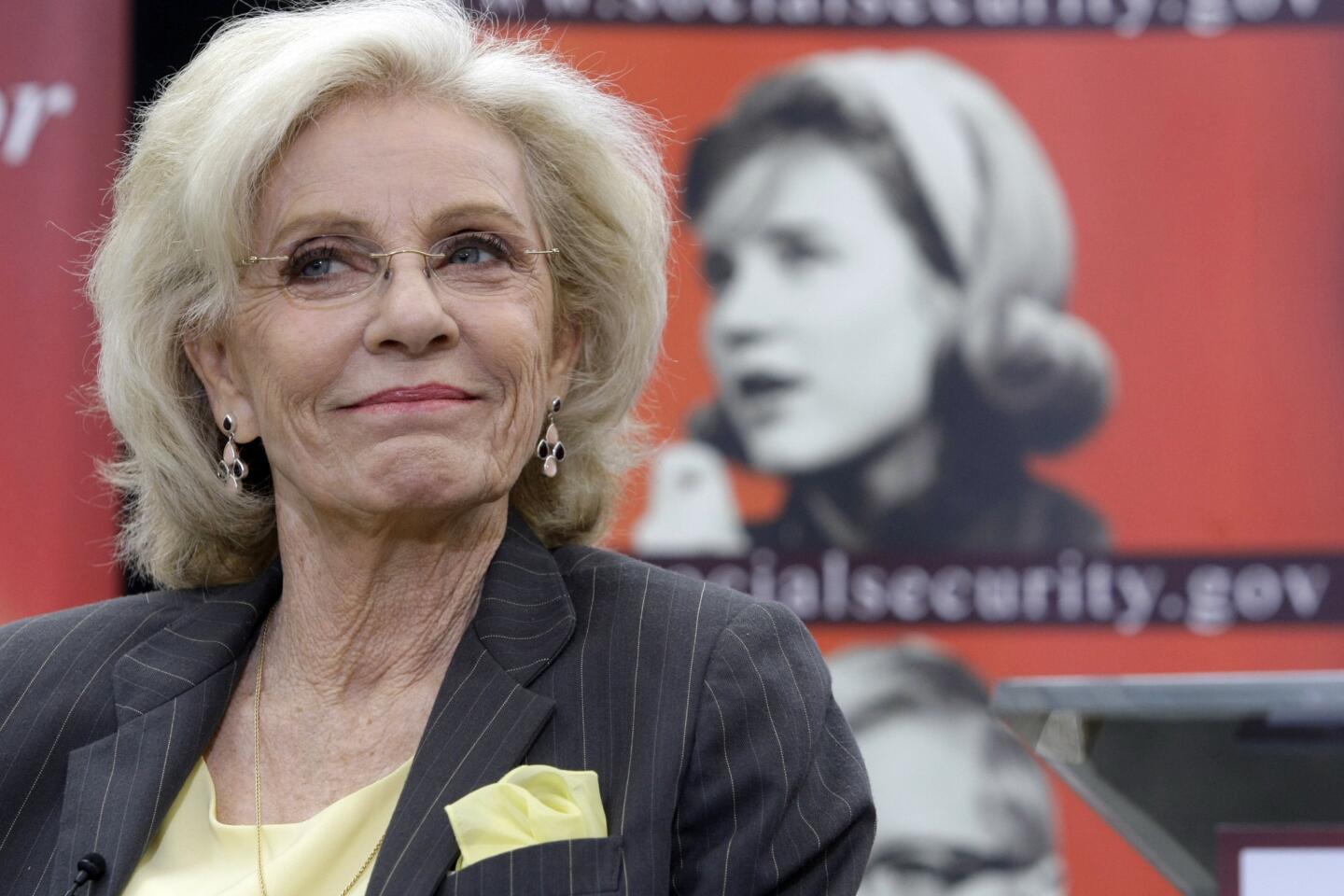Patty Duke dies at 69; Oscar winner was the youngest at the time to receive the award
Patty Duke, like so many child actors before and after, lived her life in the public eye. That spotlight brought to focus her most private struggles as she became a powerful advocate for mental illness awareness in addition to being a gifted actress.
Duke died early Tuesday morning in Coeur d’Alene, Idaho, of “sepsis from a ruptured intestine,” according to a statement from her manager. She was 69 years old.
In 1963, when she was just 16, she became the youngest person at the time to win an Oscar for supporting actress for her portrayal of Helen Keller in “The Miracle Worker,” a role she originated on Broadway.
“I don’t think it will change things for me,” the starlet told The Times after she won. “I’m still just one of the kids.”
The truth was more complicated.
Duke’s life was marked with both success and struggle. Her earliest years were marred by an alcoholic father and a violently depressive mother. From the time she was 8, Duke was raised by talent managers John and Ethel Ross. In her memoir “Call Me Anna,” Duke revealed that the Rosses left her little control over her career or life and began supplying her with alcohol and prescription medication when she was 13.
Undeterred by the challenges of her upbringing, Duke continued to find success through her craft. After her Oscar win for “The Miracle Worker,” Duke told The Times, “It seems like a dream. I’m still not sure if it happened. When they announced it, I just sat there. I couldn’t move.”
The actress had already won acclaim for the role onstage. She noted that had she grown taller, she might never have had the opportunity to play the role of the young Keller, who could not see, speak or hear after a childhood illness. Duke said a clause in her contract when she took the role in 1959 allowed for the producers to dismiss her if she grew 2 inches.
Despite her early success in “The Miracle Worker,” Duke’s film career faltered, leading her instead to conquer the small screen with her own show. Duke debuted on “The Patty Duke Show” in 1963, in which she played both main characters Patricia “Patty” Lane, all-American teenager, and Catherine “Cathy” Lane, her identical cousin from Scotland.
“Patty was very embarrassing to me,” the actress told The Times in 2013. “They would write those outrageous things for her to do. I would dive in and do it, but I couldn’t wait to get to Cathy. She was sensible, and I’d like to think she was classy.”
The show had a slightly surreal concept and a catchy theme song — “Where Cathy adores a minuet / the Ballet Russes and crêpes suzette / our Patty loves to rock and roll / a hot dog makes her lose control — what a wild duet!” It also boasted such guest stars as Sammy Davis Jr., Peter Lawford, Frankie Avalon, Sal Mineo and the British pop duo Chad and Jeremy.
Duke eventually found peace with her struggle playing TV’s famous cousins, she told The Times in 2002.
“When you walk down the street and a total stranger sings a 40-year-old theme to you, you go, ‘Someone was paying attention.’ I love it! Strangers nod and smile or call out, ‘I love you,’ ” Duke said. “What a nice way to go through life.”
After her stint as Patty and Cathy Lane on television, Duke tried to transition back to film with a controversial performance as Neely O’Hara in “Valley of the Dolls,” in which the actress portrayed an alcoholic, drug-addled star. Seeing the actress in the role caused severe dissonance for audiences and critics alike, even as the film found a cult audience with time.
Later, Duke would discover her passion for mental illness awareness advocacy, a quest that rose out of her own diagnosis with bipolar disorder in 1982. Duke credited medication and therapy for aiding her recovery; she was the first celebrity, via her 1987 autobiography, to make her struggle with bipolar disorder public.
The actress had said she was grateful for her close relationships with son and “The Lord of the Rings” star Sean Astin, 45, and his actor brother, Mackenzie Astin, 42, despite the rough childhood to which she subjected them before her illness was diagnosed. Her family called her Anna Banana. After Sean had his own children, she became Nana Anna Banana.
“I had no patience,” she admitted to The Times. “The thing that these kids had going against them was that you never knew when what was all hunky-dory was going to fly out the window and you were going to be screamed at and berated and either ostracized or made to do some humiliating punishment.”
The TV star was also stepmother to the children of her fourth husband, Michael Pearce: daughters Charlene, a genetic researcher, and Raelene, who drowned in a 1998 car accident at age 22. In 1988, Pearce and Duke adopted a son, Kevin, who became a firefighter.
Now her son Sean hopes his mother’s mental health advocacy continues after her death.
“Before the suffering became too great, we talked about how the core mission of her mental health work might continue beyond her life,” Sean said in the introduction to a newly launched Crowdrise campaign in his mother’s honor, the proceeds of which will be used to establish the Patty Duke Mental Health Initiative, dedicated to continuing support of mental health programs.
Of his mother, Sean said, “She became a voice for the voiceless, a reassuring presence for the scared, the intimidated and the lost. She was a healer of many souls and a champion for so many in need.”
FROM THE ARCHIVES:
Patty Duke looks back on ‘The Patty Duke Show’
Patty Duke was a child star on screen, but a late bloomer on stage
Our 1962 review of Patty Duke’s Oscar-winning performance: A ‘Miracle’ Picture? Seeing Is Believing
Follow Libby Hill on Twitter @midwestspitfire
The complete guide to home viewing
Get Screen Gab for everything about the TV shows and streaming movies everyone’s talking about.
You may occasionally receive promotional content from the Los Angeles Times.








